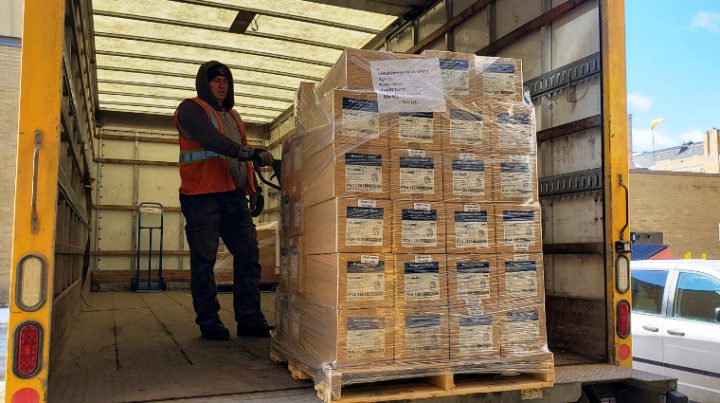Saskatchewan Polytechnic says it recently collected thousands of pieces of personal protective equipment (PPE) from its facilities to help keep the province’s front-line health-care workers safe against the novel coronavirus.

The post-secondary institution announced on Wednesday its staff conducted an inventory of supplies at the Moose Jaw, Prince Albert, Regina and Saskatoon campuses.
While following proper safety guidelines, employees gathered the materials from storage and shrink-wrapped them for shipment.
Seven pallets were shipped to a central location identified by the provincial government for distribution to health regions throughout the province, officials said.

Get weekly health news
The items for the COVID-19 response include:
•741 boxes of gloves;
•40 boxes of masks with face shields;
•212 boxes of procedural masks;
•219 boxes of N95 and another 420 N95 masks;
•Four boxes of surgical masks;
•780 isolation gowns;
•41 containers of hand sanitizer; and
•20 tubs of wipes.
These “much-needed” items are especially important in safeguarding the health of doctors, nurses and other health care professionals treating cases during the COVID-19 pandemic, according to a press release.
Questions about COVID-19? Here are some things you need to know:
Health officials caution against all international travel. Returning travellers are legally obligated to self-isolate for 14 days, beginning March 26, in case they develop symptoms and to prevent spreading the virus to others. Some provinces and territories have also implemented additional recommendations or enforcement measures to ensure those returning to the area self-isolate.
Symptoms can include fever, cough and difficulty breathing — very similar to a cold or flu. Some people can develop a more severe illness. People most at risk of this include older adults and people with severe chronic medical conditions like heart, lung or kidney disease. If you develop symptoms, contact public health authorities.
To prevent the virus from spreading, experts recommend frequent handwashing and coughing into your sleeve. They also recommend minimizing contact with others, staying home as much as possible and maintaining a distance of two metres from other people if you go out.
For full COVID-19 coverage from Global News, click here.









Comments
Want to discuss? Please read our Commenting Policy first.